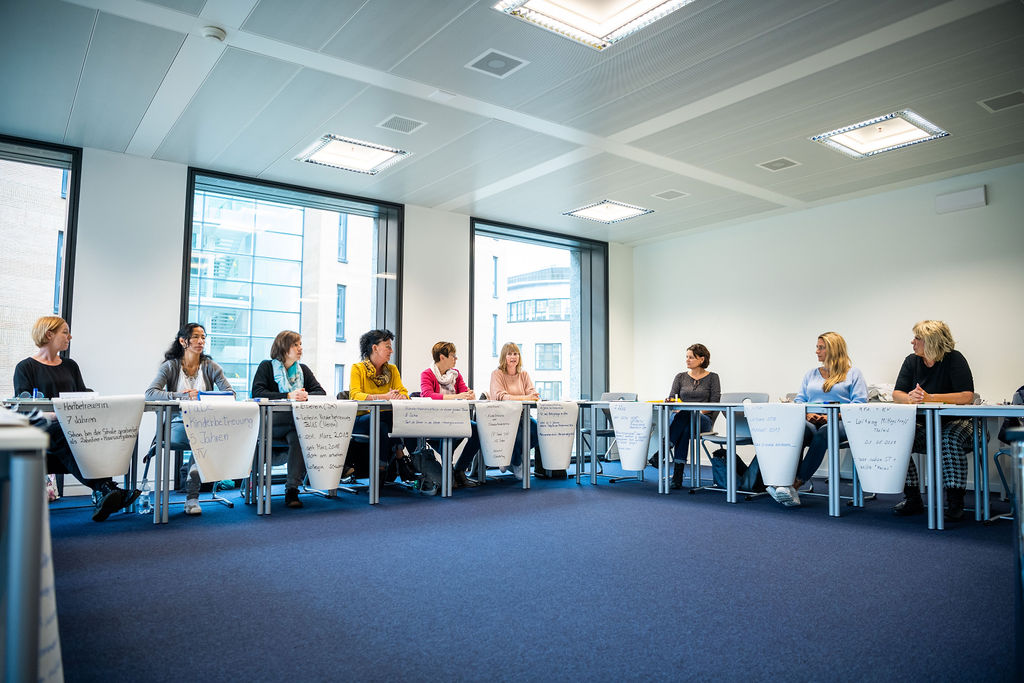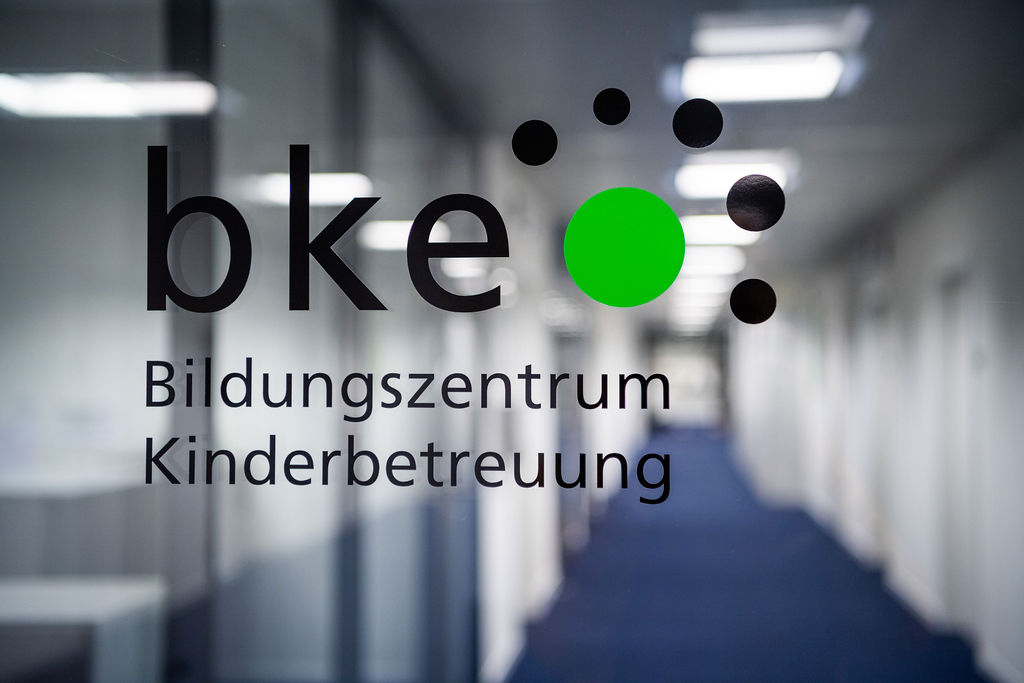Vocational trainer course FaBe K: Experiences and tips from the head of the practice area and course leaders from the bke childcare training center
A vocational training course teaches the basics of caring for learners in everyday working life. As an educational institute, the bke Bildungszentrum Kinderbetreuung offers a vocational training course for childcare specialists. The training center has been committed to the competent and professional training and continuing education, further training of people in family and supplementary school care for over 40 years. This course is specifically designed for the childcare sector and for professions in the field of family and supplementary school care. The Head of Practice, Jeannine Wieser, and the course instructors Bea Glanzmann, Eveline Sägesser, Fabienne Jung, Michael Rütimann and Franz Krupp answered our most burning questions about the eduQua-certified FaBe K vocational trainer course.

Who is the target group for the vocational training course for childcare specialists?
The vocational training course Childcare Specialist is suitable for anyone who is responsible for and supervises a learner. Even if this person does not have sole responsibility for the learner and is "only" responsible for accompanying the learner in practice. This is because every person who teaches learners in vocational education and training (VET) should know the most basic framework conditions. These are taught as initial building blocks in the FaBe K vocational trainer course. Overall, the training of learners includes the placement, supervision, guidance and support of learners. The BB course is therefore aimed at:
- Technical assistants who accompany apprentices in their institution or have the goal of carrying out this activity in the future
- Persons who manage an institution but are not familiar with apprenticeship training and have overall responsibility for vocational training in the institution.
The Zurich cantonal vocational training fund also contributes CHF 250 towards the course costs for companies in the canton of Zurich. Other cantons also contribute to the costs. The bke will be happy to inform you.

What distinguishes the FaBe K vocational trainer course from courses in other sectors or professions?
Our FaBe K vocational training course is specifically geared towards the caregiver sector in family and supplementary school care. Thanks to specialist lecturers and industry-oriented theories, the course is very practice-oriented. There is a great understanding of industry-specific topics, problems and challenges. In this way, knowledge relating to the requirements of the profession can be made concrete and precisely transparent. We create a concrete reference to FaBe apprenticeship training tools with direct application possibilities for practice. Our lecturers have their own practical, subject-specific experience in training FaBe K. This is because they not only know the theories, but also the situations and challenges on site. This enables them to give tips, big and small. Participants in the vocational trainer course for apprentices receive a course certificate if they attend one hundred percent of the course. This is a certificate issued by the Secondary School and Vocational Training Office of the Canton of Zurich (MBA). The certificate is valid throughout Switzerland and is recognized by SERI.

What particular challenges do "vocational trainers" face in the profession of childcare specialist?
Apprentices are still very young for the responsibility they have to bear very early on in the company. Care must be taken not to regard apprentices as low-cost employees, but really as learners. It is important to adhere to competencies for the protection of apprentices. When there are staff shortages, learners often have to do more than their skills and abilities currently allow. This leads to excessive demands. If this situation continues during the main training period, many learners no longer want to work in the occupational field after completing their training. They feel exploited and unfortunately often burn out. The vocational trainer often has too little time available to be able to fully support the apprentice. This leads to an imbalance, which is felt not least by the learner. In many cases, the vocational trainers are very young and have little practical experience. There are many guidelines but no "state/cantonal" controls. The classic challenges faced by vocational trainers in the occupation of VET assistant K are
- Patience, listening, perception and understanding boundaries
- It takes a lot of initiative to ensure a high-quality education
- the high demands of daycare centers
- General pressure from daycare centers, as experienced by qualified staff, namely multitasking, low prestige and a high workload
- Maintaining mental health
- Lack of time due to lack of resources
- Different approaches in the various cantons with regard to electronic training tools, practical final examination (differences in requirements), training tools
- Different implementation of the education ordinance (gray areas, recommendations)

What else is special about the FaBe K vocational trainer course?
Our vocational trainer course FaBe K consists of weekly courses that take place three times a year. This and courses offered during the school vacations enable many prospective vocational trainers to take part. They can also quickly catch up on missed course days. Our training center is located right next to the train station. We offer a very good infrastructure on site. In addition, course participants receive modern course materials in the form of handouts, which make their work easier in practice. We value the exchange with "like-minded people" who come from the same professional field. This makes the learning content very practical and to the point. If the courses cannot take place on site, we offer them online.
What knowledge would you like to pass on in the "Vocational trainer" course?
In the course, we want to pass on that the vocational trainer is aware of the great responsibility of training - not only towards the learners, but also towards the entire professional field. For their part, they need to understand the situation of learners in their developmental phase (adolescence) and we try to sensitize them to this. In the FaBe K vocational trainer course, we teach what it means to be a role model and what makes a good role model. The necessary knowledge includes
- Guide and accompany without exercising power
- How can I motivate
- Be mindful of others
- where do I have to set limits
- Which skills do I need to strengthen?
- Prevention measures for addiction, crises, mental and physical health and early detection of these issues
- Intervention in crises and addiction
- Importance of workplace safety and ergonomic carrying and lifting
- Getting to know your own limits and setting them
- Sensitize course participants to their responsible role, because they have a decisive influence on the learners and these in turn will shape the children of the future
- Empowering course participants with tools and aids to be able to act even in challenging situations
- Sensitize participants in the job profile course to the individuality of the learners and point out possibilities and variants to optimally promote, accompany and support the different individuals according to the situation
- Promote understanding of learning processes in order to use different methods and tools in practice with the aim of appealing to different types of learners
- Familiarize course participants with training tools and the training plan or process so that they are capable and confident in practice

What tools and methods does a vocational trainer need for day-to-day vocational training?
We provide our future vocational trainers with the following tools and methods in the FaBe K vocational trainer course:
- Handbook on vocational education and training (VET)
- Handout for each course day
- Moderations
- Discussion rounds in the plenum
- Creative exchange rounds in small groups
- Role plays for practicing observation and reflection
- Variety
- Humor
- Share your own experiences, mistakes and challenges as a course leader
- Where can I find what to do with the training folder (Savoir Social), topic-related handouts and ongoing additions to it
- Prevention measures for addiction, crises, mental and physical health
- Early detection of the issues mentioned
- Importance of workplace safety and ergonomic carrying and lifting
- Intervention in crises and addiction
- Get to know your own limits and set them
- Templates from Savoir Social (work and project documentation, education report, model course / performance target catalog)
- Assessment criteria
- Company and individual training plan
- Assessment and qualification tools (Savoirsocial / epak)
- Qualicarte from the basic vocational training handbook
- Maturity model according to Hersey / Blanchar
- Iceberg model
- Conflict strategies
- Learning types according to Kolb
Vocational trainer course FaBe K: What challenges do apprentices and vocational trainers face on a daily basis?
In our vocational trainer course FaBe K, we address both the daily challenges of apprentices and those of vocational trainers.
Vocational trainer:
- Working with young people
- Overloading learners
- cultural topics
- Demotivation
- difficulties at school
- Conflicts
- different values
- Little time for exchange and instruction vessels lead to pressure
- Development crises
- Unclear communication
- Time factor
- Who is responsible for what?
- Missing job or activity description
- Non-compliance with agreements
- Dealing with great pressure from learners
- Dealing with your own pressure
- own time management
- offer high quality training
- Questions of action competence
- Themes of adolescence
Learners:
- Many changes of vocational trainer
- Little time for training discussions and exchanges
- must meet high expectations
- heavy workload due to staff shortages
- Non-compliance with legal requirements: writing work documentation (AD) and process documentation (PD) at home, youth protection (working overtime, etc.)
- Little support from the company and the "vocational trainer"
"Vocational trainers": What tips can you give them for dealing with these challenges?
Perseverance and patience are important. What is even more important is the joy of training, especially with young adults. You should always remember your own training and apprenticeship period. However, it is also important to set and demonstrate boundaries and clear guidelines as well as transparency. We practise this in the vocational trainer course using examples.
- Tips for motivation and maintaining motivation
- Apply a professional selection procedure
- Putting yourself in young people's shoes and acting according to the situation
- Disruptions have priority (address, take up and discuss conflicts, situations, difficulties)
- If possible, promote the relationship triangle of parents / school / company
- Inform, integrate and get management on board
- Writing down conversations / agreements / arrangements / targets e.g. memos (binding nature, traceability)
- Clarify the tasks of the 3 learning locations (school, company and home)
- Make school visits, establish and maintain contact with school teachers
- How can the DA show empathy and what does it achieve?
- explain the psychosocial development in order to understand the WHY and to be able to react adequately to it
- Uniform approach within the team, binding structures and boundaries
- Use legal foundations as framework conditions
- in which documents can solutions and assistance be found (e.g. vocational education and training information sheets and various other information sheets)
- Apply strategies for conflict resolution
- Use tips on conducting discussions, time management, etc.
- Networking with other vocational trainers in order to be able to use practical examples from others and apply practical tips from your own experience
- In case of doubt or complex questions, turn to known contact points or involve external specialist agencies
- Use supplementary courses (new from September 2021 at the bke: Diploma course for vocational trainers in training companies)
